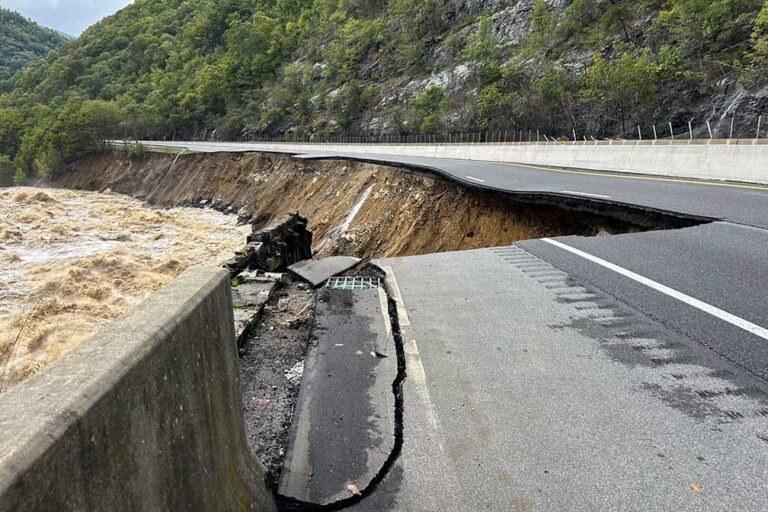PERRY, Fla. — Authorities rushed to airlift supplies and restore communications and roads in flooded Asheville, North Carolina, on Sunday, Sept. 30, as residents along the storm-battered Florida coast gathered for church services amid the wreckage of Hurricane Helene.
Massive rains from the powerful Helene left people stranded, without shelter and awaiting rescue around the U.S. Southeast. Cleanup continued Sunday from a tempest that killed at least 64 people, caused widespread destruction across the southeastern states and knocked out power to several million people.
As the sun rose over Florida’s Big Bend on the Sunday after Hurricane Helene battered the region, many houses of worship were still dealing with power outages, damaged roofs and hurricane debris — and the knowledge that many of their congregants are shouldering another hit from a devastating storm.
More than 1,000 miles away in Texas, Jessica Drye Turner begged for someone to rescue her family members stranded on their rooftop in Asheville, North Carolina, surrounded by rising flood waters. “They are watching 18 wheelers and cars floating by,” Turner wrote in an urgent Facebook post on Friday.
But in a follow-up message, which became widely circulated on social media on Saturday, Turner said help had not arrived in time to save her parents, both in their 70s, and her six-year-old nephew. The roof had collapsed and the three drowned.
“I cannot convey in words the sorrow, heartbreak and devastation my sisters and I are going through nor imagine the pain before us,” she wrote.
Helene blew ashore in Florida’s Big Bend region as a Category 4 hurricane late Thursday with winds of 140 mph.
From there, it quickly moved through Georgia, where Gov. Brian Kemp said Saturday that it “looks like a bomb went off” after viewing splintered homes and debris-covered highways from the air. Weakened, Helene then soaked the Carolinas and Tennessee with torrential rains, sending creeks and rivers over their banks and straining dams.
Western North Carolina was isolated because of landslides and flooding that forced the closure of Interstate 40 and other roads. There have been hundreds of water rescues, none more dramatic than in rural Unicoi County in East Tennessee, where dozens of patients and staff were plucked by helicopter from a hospital rooftop Friday. And the rescues continued into the following day in Buncombe County, North Carolina, where part of Asheville was under water.
The storm was expected to hover over the Tennessee Valley on Saturday and Sunday, the National Hurricane Center said.
It unleashed the worst flooding in a century in North Carolina. One community, Spruce Pine, was doused with over 2 feet of rain from Tuesday through Saturday.
In Florida’s Big Bend, some lost nearly everything they own, emerging from the storm without even a pair of shoes. With sanctuaries still darkened in a county as of Sunday morning, 97% of customers were without power, some churches canceled regular services, while others like Faith Baptist Church in Perry opted to worship outside.
Standing water and tree debris still covers the grounds of Faith Baptist Church. The church called on parishioners to come “pray for our community” in a message posted to the congregation’s Facebook page.
“Still no power, or water — so bathrooms will be unavailable. We have chairs, or you can bring your own!” the post reads.
In Atlanta, 11.12 inches of rain fell over 48 hours, the most the city has seen over two days since record keeping began in 1878.
President Joe Biden said Saturday that Helene’s devastation has been “overwhelming” and pledged to send help. He also approved a disaster declaration for North Carolina, making federal funding available for affected individuals.
With at least 25 killed in South Carolina, Helene is the deadliest tropical cyclone for the state since Hurricane Hugo killed 35 people when it came ashore just north of Charleston in 1989. Deaths also have been reported in Florida, Georgia, North Carolina and Virginia.
Moody’s Analytics said it expects $15 billion to $26 billion in property damage. AccuWeather’s preliminary estimate of the total damage and economic loss from Helene in the U.S. is between $95 billion and $110 billion.
Evacuations began before the storm hit and continued as lakes overtopped dams, including one in North Carolina that forms a lake featured in the movie “Dirty Dancing.” Helicopters were used to rescue some people from flooded homes.
Among the 11 confirmed deaths in Florida were nine people who drowned in their homes in a mandatory evacuation area on the Gulf Coast in Pinellas County, Sheriff Bob Gualtieri said.
None of the victims were from Taylor County, which is where the storm made landfall. It came ashore near the mouth of the Aucilla River, about 20 miles northwest of where Hurricane Idalia hit last year at nearly the same ferocity.
Taylor County is in Florida’s Big Bend, which went years without taking a direct hit from a hurricane. But after Idalia and two other storms in a little over a year, the area is beginning to feel like a hurricane superhighway.
“It’s bringing everybody to reality about what this is now with disasters,” said John Berg, 76, a resident of Steinhatchee, a small fishing town and weekend getaway.
Climate change has exacerbated conditions that allow such storms to thrive, rapidly intensifying in warming waters and turning into powerful cyclones sometimes in a matter of hours.
Helene was the eighth named storm of the Atlantic hurricane season, which began June 1. The National Oceanic and Atmospheric Administration has predicted an above-average season this year because of record-warm ocean temperatures.
The Associated Press is an independent global news organization dedicated to factual reporting. Founded in 1846, AP today remains the most trusted source of fast, accurate, unbiased news in all formats and the essential provider of the technology and services vital to the news business. The Trucker Media Group is subscriber of The Associated Press has been granted the license to use this content on TheTrucker.com and The Trucker newspaper in accordance with its Content License Agreement with The Associated Press.







